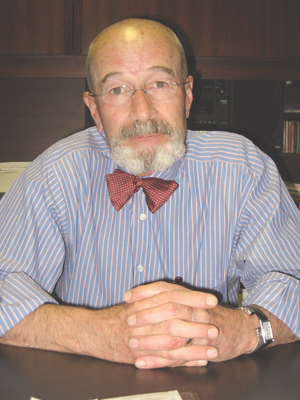WINDSOR, Ont. — For Windsor defence lawyer Greg Goulin, the Sept. 1 opening of the Windsor Residence for Young Men represents not only a personal dream come true but it also fills a large gap in the city’s social services.

Amazingly, the city up until now hasn’t had a residence for homeless male youth. There are, however, three such residences for young women. Goulin, a well-known community activist who has received commendations over the years for his work supporting youth, has long served as a board member for one of those residences, The Inn of Windsor.
The new residence won’t be a halfway house nor will it specifically be for young men in trouble with the law. The aim is to provide a home for youth who might be vulnerable to criminal attacks as street youth and to prevent them from sliding into criminal behaviour.
“Just the opposite,” says Goulin, who has spearheaded the project for more than a decade with his wife, Bonnie Patrick, a solicitor with a commercial, wills, and estates practice. “This is not a place of detention. We’re looking at the victims of crime.”
He cites a statistic indicating that 40 per cent of sexual assaults, for example, involve attacks against young males of the age group the residence will serve.
Motivating Goulin and Patrick to seek to open a residence was an incident in the late 1990s in which a young man had to leave the family home due to marital breakdown and ended up in the Salvation Army dormitory. During that time, he got into an argument with an older resident. That led to a fight that nearly killed him, says Goulin.
It’s not unusual for males in their late teens to be homeless. In fact, the term “couch surfing” has entered the popular lexicon. One TV ad, for example, shows police searching an abandoned house only to find a kid wrapped in a sleeping bag with his flashlight on a book. He tells them he’s studying.
Local school authorities in Windsor estimate there are roughly 100 homeless male youth in a city of about 200,000 people. “The police are constantly coming across these kids in vacant homes,” says Goulin.
Goulin, a former president of the Ontario Bar Association, and a group of associates on the residence’s board raised $225,000 for the purchase of a former Ukrainian religious education centre in a central Windsor neighbourhood in order to make his dream a reality. The early-1980s building is “remarkable,” says Goulin.
“You couldn’t have designed a better place.” The building combines offices for counselling, classrooms, and a residential area where 10 people can live under supervision. There’s also a kitchen and laundry room.
The residence will put the young men up for 90 days. “You get them in, you get them stabilized,” says Goulin.
“You don’t know what they’re coming in with. They may be coming in with trauma. They may have been kicked out of the home.”
Administrators will first attempt to link the new resident with his family. If it proves impossible for the youth to return home, he can stay at the residence. But there are conditions. The youth must be in school if still of age. The house is strategically located close to bus routes and high schools.
While in the residence, youth also learn life skills such as cooking, doing laundry, and keeping their rooms clean. After 90 days, they can apply for welfare and move into a shared subsidized residence. Legally at 16, they’re independent and can’t be compelled to return home.
Justice Micheline Rawlins of the Ontario Court of Justice in Windsor, who’s also a longtime community activist, says no other agency wants these young men. Children’s aid services usually look after kids by putting them in foster care until age 16. Unless adoption is in the offing, agencies are reluctant to go further and apply for Crown ward status.
As a result, homeless teens can slip into crime because they have no resources.
“When people are kicked out of their home, they have to eat,” says Rawlins. “So they’re going to steal something to eat, or they’re going to break into someone’s residence or they eat and sleep there because they know no one’s there. Now that’s break and enter and you’re stealing the food. That’s break and enter with intent even though you’re doing it for survival purposes.”
The fundraising drive has been a truly grassroots effort. The legal community has contributed generously. The local bar donated money, as did the OBA, which gave Goulin funds for the residence as a parting gift from his presidency at the organization.
Windsor criminal lawyer Ken Marley says lawyers came together to support the venture. “I think there was also a certain amount of respect for Mr. Goulin, for whom this has been a big cause, one he’s been working towards for many years.”
Marley says he can’t provide a statistical correlation between homeless youth and crime but notes he has seen evidence of it.
“So if there’s a place where they can get out of living off the street or living from friend’s house to friend’s house and at the same time get some positive role models, that’s more than helpful.”
For Goulin, his personal mission is not only “payback time” for almost 40 years of making a good living defending such youth, it also represents an ongoing commitment to the more vulnerable members of the community. “You’ve got to continue to earn it,” he says.

